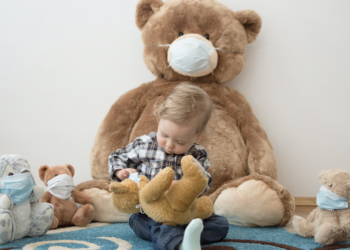PANS PANDAS – A Parents Guide
12th December 2020
What is PANS PANDAS?
PANS PANDAS is a disease that affects children and results in symptoms such as obsessive compulsive behaviours, tics, anxiety, urinary problems (such as wetting or enuresis) and eating problems including difficulty swallowing or eating restriction. The symptoms usually occurr suddenly in a child that has previously developed normally. Some parents describe it as “like a switch has been thrown”. A survey of the patients treated by the Children’s e-Hospital has shown that the commonest symptoms are tics and obsessive compulsive behaviour. The term PANS PANDAS actually encompasses 2 disease processes; PANS & PANDAS. These diseases are immune mediated and some health professionals refer to them as “Immune Mediated Behavioural Change“.
What is the difference between PANS & PANDAS?
PANS (Paediatric Autoimmune Neuropsychiatric Syndrome) can be considered to be an umbrella term to cover a number of different causes of sudden onset Tics and Obsessive Compulsive Behaviour. When the causative organism is identified as streptococcus (a common bacterium that causes sore throats, chest infections, sinus infections and skin infections amongst others) we call the disease PANDAS (Paediatric Autoimmune Neuropsychiatric Disorder Associated with Streptococcus). You can read more about PANDAS using the links on this page or by going to the home page on The Children’s e-Hospital website.
What happens to cause the symptoms?
The easiest way to understand the disease process is to give an overview of PANDAS. With PANDAS the affected child will at some point develop a streptococcal infection and the body,quite appropriately, produces antibodies to fight the infection. Unfortunately the antibodies that are produced cross react with the brain causing inflammation and then symptoms.It is important to understand that the symptoms of PANDAS often occurr once the active infection is over.
How is it diagnosed?
The key elements in obtaining a diagnosis is to review the history and organise the appropriate investigations to obtain objective evidence of the disease process. Most children will have been through a process of examination by a primary care physician (GP), paediatrician or paediatric neurologist and the confirmation of a diagnosis is unfortunately very dependent on whether or not the treating doctor is familiar with these conditions. A survey carried out by The Children’s e-Hospital in 2019 showed that 90% of GP’s were unfamiliar with PANS PANDAS.
How is it treated?
The main strands of treatment are to use antibiotics and anti-inflammatory therapies to control infection and inflammation. In the UK we have learnt how to treat patients without the need for intravenous immunoglobulin (IVIG) except in the most severe cases. Immunoglobulin therapy simply mops up the causative antibodies but in the UK we have been unable to access this therapy easily due to contract restrictions in the NHS. Dr Tim Ubhi has treated over 500 patients with PANS PANDAS and has developed a model of care that in the majority of patients removes the need for IVIG. This model of care also reduces the need for long term antibiotic therapy (which is used in some parts of the world, particulalrly the US). The Children’s e-hospital model of care is therefore more aligned with the traditional models of care that exist in the UK. The last audit of the patients treated by The Children’s e-Hospital showed that nearly three quarters of patients had a good response to treatment.
What is the prognosis?
If treated early, the outlook for patients is very good. Early recognition and prompt treatment is essential to ensure that full recovery happens as quickly as possible.
Are there treatment guidelines?
Treatment guidelines are used by the Children’s e-Hospital that are based on treatment guidelines produced by the UK PANS PANDAS Physicians Network in 2018. These guidelines were agreed and signed off by Paediatric Neurologists, Paediatricians,Child and Adolescent Psychiatrists and Immunologists from some of the major centres in the UK including The Evelina Hospital (London), Birmingham Children’s Hospital, Alder Hey Children’s Hospital, and Darlington Hospital.
Helping children to understand what’s going on
The Children’s e-Hospital has written a story about Sam and his journey with PANDAS to help children understand what it is like to have PANDAS. You can read “Sam has PANDAS” in The Kids Zone.
Where can I get help?
You can book an appointment with Dr Tim Ubhi at The Children’s e-Hospital using the following link: Book an appointment
Posted in: PANDAS & PANS, Dr Tim Ubhi, Parent advice by Tim





Comments
Suki Dhillon
2024-02-23 04:28:42
I would like to enquire as my daughter has been suffering since age 2 and has behavioural issues because something isnt right and it all started after she kept repeatedly getting sick. I would like to know the costing and whats included in the consultation.
Steff
2024-02-13 06:09:40
I would like to enquire about my little boy situation, he started to have an habitual tick at around the time he turned 2. Now is 5 years and half and the tick still there.. on and off… the only advice from the GP was to ignore it… but after 3 years and half not stopped yet.
James Miles
2023-09-12 16:44:52
I would like to enquire about treatment for my son who have been suffering for over a year now. I would like a full price for diagnosis and treatment. Please. And to make an appointment
geraldine delay
2023-09-03 23:23:19
C'est incroyable ! Enfin depuis des années de recherches personnelles, je comprends mieux les problèmes de ma fille adolescente diagnostiquée TSA atypique à 5 ans mais je n'ai jamais cru en ce diagnostic ! Peut être qu'elle va enfin pouvoir être soignée car elle régresse beaucoup en ce moment ...
CBT treatment for OCD
2022-11-04 16:11:40
I strongly appreciate this blog! Everything is clear to me now, thank you also for the reminders and tips here, this is a great article. Very informative and is worth reading.
Pans Pandas Symptoms
2022-09-26 16:46:37
I agree and appreciate this article. It is very interesting! thanks for taking the time to discuss this, I feel that I love to read more on this topic
ADHD Executive Function
2022-09-20 17:20:02
This is a "must-read" piece, if I may say so! Amazing work. It's great, and the advice is quite helpful.
CBT treatment for OCD
2022-08-30 18:22:58
Everything was clear to me now after reading this article. I found it very useful to all the readers. It is worth reading.
Neurofeedback therapist
2022-08-26 18:17:54
Everything is clear to me now after reading this article. Everything was explained and differentiated well, the topic is very useful.
Pans Pandas Symptoms
2022-08-12 18:15:46
I could say that this article is excellent. It gave a lot of information or ideas. It's worth reading.
Neurofeedback for anxiety
2022-08-02 18:46:27
This article is definitely one that you should read! Superb work. Really great stuff, great advice.
pans diagnosis
2022-07-04 19:15:27
Thank you for sharing this very reliable and informative article. I appreciate this a lot, actually, I love it. It is worth reading and share.
Neurofeedback treatment
2022-06-29 21:58:23
Such a great blog, thank you for the tips. Everything was explained very well and clear. I appreciate it very much.